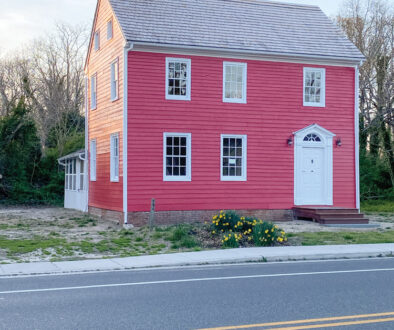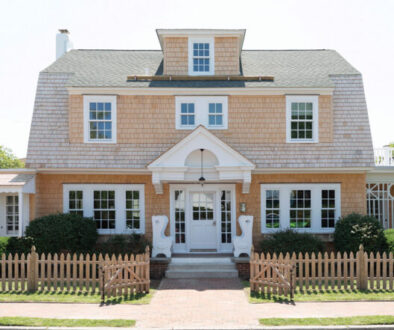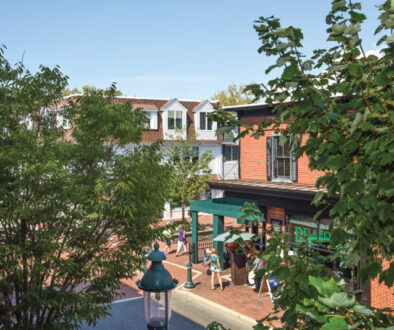Eliza Lotozo
Eliza Lotozo lives in the house she grew up in. Nestled on West Cape May’s rural Stimpson Lane with its door’s-always-open feel and Bohemian eclecticism interior, the house reflects the free-spirited, art-based community here which has thrived for generations. As I entered her home, the topics I’d planned to discuss were swept away by the wonderful eccentricities that greeted me. I immediately wanted to know the story behind each oil painting, sculpture, vintage lamp shade, and mid-century chair that filled the room.

A large bar, complete with stools and shelves of fine liquors and carefully labeled homemade bitters, was the nucleus of the living area. It belongs to Eliza’s boyfriend, Matt Reeves, one of Cape May’s most iconic bartenders. Eliza explained that the bar serves as a working studio for many of Matt’s signature creations.
Eliza led me to her back sunporch, built of repurposed lumber and architectural salvage and filled with lush plants and whimsical pieces of eco-art. Seated at a large banquet-size table, we discussed the life of a true native.
I understand you studied accounting in college, but your life has taken a completely different path.
I graduated from Lower Township High school in 2008, then studied at University of South Carolina for four years for an accounting degree. I knew halfway through college that I had no interest in being an accountant. But a business degree felt practical, and I think it’s served me well. I’m studying now at Stockton toward an MBA in Business Administration.
Clearly, you’re artistic and love the eclectic.
I’ve always been surrounded by creative people. This house is filled with my friends’ art. I love it and I feed off it. I feel that I lean toward the analytical. My mom would disagree with me.
As teens, many of your generationvowed to move away, then returned.
That’s one of my favorite topics. I actually skipped my college graduation and went to Jazz Fest in New Orleans with my mom. We were there with Michael Kline. It was the year before he started the Exit Zero Jazz Festival in Cape May. I knew I would probably be coming home, but when he told me he was bringing the Jazz Festival back to Cape May and asked me to work with him I knew it. That was 2012. So, I kind of fell into coming home. Back then, I felt there was a lot of judgment or self-perceived failure which you find often in young people who return to their community. I want to dispel that.
What do you see or appreciate about your hometown now that you didn’t see when you were a teenager?
I’ve gotten quite an education in working for Cape May MAC as their Chief Outreach Officer. They’re responsible for saving so much of the Victorian architecture in town and for how the tourism industry has evolved. I’ve learned so much about what goes on behind the scenes. When you’re a kid growing up here, you see these arts organizations like Cape May Stage and East Lynne, and you just think that’s the way it is. I now see all the hard work behind it.
Before you became MAC’s Chief Outreach Officer, MAC was really behind the times with social media. Now, it really seems to speak directly to a very young demographic in their 20s and 30s.
When I started, my job was to assist with social media and marketing. My attitude was that I was a local and wondered why I hadn’t heard of any of the stuff that MAC does. It had never occurred to me who ran the trolley tours or the lighthouse and knowing those are connected. When growing up here, those things are just there. So, my soapbox was to not only inform people my own age but to make sure the locals knew and were engaged. Social media platforms were the way to go.
Was that an easy sell?
With any organization that has been around for so long, change is an uphill battle. But I’m lucky that the timing of my arrival was right because the organization was very ready for a change.
What has been your proudest achievement with MAC so far?
My proudest would be the rebranding which was unveiled in 2020. Unfortunately, because of the pandemic it didn’t get the fanfare that we intended. It was a three-year project that came out of a strategic planning meeting about what we needed to do in our future.
Were the older people at MAC receptive to the idea of rebranding?
To varying degrees. It was something I felt strongly about, and we were at a moment in time when it had to happen.
The current trend in branding seems to be very clean, quick, and crisp. I would even say stripped-down. For over 50 years, MAC has had the same product of old Victorian opulence, with the Physick Estate and the historic tours. How do you take a static product and re-package it for an audience of 18- to 30-year-olds?
For many people, even on our board, branding stopped at our logos. In 2020, the changing of our name and our website was just the gateway. You must capture people first and make them feel you’ve got something they want to do. When you go further, it trickles down to how you’re telling your story and how you’re interpreting the product you sell. To reach those younger audiences, we not only have to get them into our front door but make sure that visually they’re getting the product they saw.
Can you explain that further using the Physick Estate as an example?
Okay, so let’s ask ourselves what resonates with an 18- to 25-year-old when they take a tour of a Victorian house museum. The answer is in interpretation. Recently I went to a museum in Connecticut that had a good example of what I was trying to explain. The museum was a blend of a historic home and an artists’ community. So, you not only have historic art and information about the various significant artists, but then there are changing exhibits of modern art. They not only interpret the artists’ work as to what the pieces were trying to convey, but they had gone a step further and related it to the current times, specifically the pandemic and the social movements that have been very active in recent years. Every piece in that museum had a contemporary through-line. To me that was a great job of interpretation for a museum.
How do you apply that to your job at MAC?
It’s hard but not impossible to do that with history. We all know the saying, “history repeats itself” so you can always pull something from a previous time and connect it to a current reality. If we can make connections to modern time to make our historical figures relatable, that’s how the branding trickles down.
When I gave tours at the Physick Estate back in the 1980s, we didn’t allow photography. Has that changed with today’s social-media culture?
We did change our policy and now allow photography for tourgoers. If someone is planning to film or photograph for a professional project, we have a formal policy that they must work with. As for everyday visitors, people love to share their experience and that has helped greatly with social media. In the marketing world, it’s called user-generated content and we share a lot of user content that they share with us.
I understand from friends that one of your passions is cooking. I was told to ask you about a goat leg.
Ah, yes, the goat leg story! That was an adventure. My dad was a cook, and my sister and I inherited his adventurous love of food. A big pastime for me during the pandemic was cooking outside my comfort zone. I found a Nigerian goat leg recipe and decided I wanted to make it. I had to go on an adventure to find a goat leg. I ended up at a Halal butcher in Philadelphia and found it. My sister lives in Brooklyn and was able to find the West African spices needed. (Eliza walks to her kitchen cabinet and returns with a colorfully decorated box) My sister sent me this, I couldn’t find it anywhere. This is a box of FuFu, which is a plantain flour. It’s used to make a very gluey dough that you eat with stews. This part of it failed because mine stayed like glue and didn’t turn into dough, so we ate the goat leg stew with rice instead. Making it was a 2-day process which I documented on Instagram.
Would Cape May benefit from a restaurant that dealt a bit more in the exotic? Perhaps one that serves Nigerian and African fare?
We have an amazing restaurant scene in Cape May, but I definitely think there’s room for diversity. I travel to find interesting foods and would love to see more young, creative-minded people come to start businesses here. And in saying that, I hope Cape May isn’t pricing out that kind of creative entrepreneurship. Perhaps the downside of our increasing success is that it’s hard to establish yourself here if you don’t already have a foot in the door. I’d love to see the community find a way for that diversity. I’d love to eat some Nigerian cuisine in Cape May.
Getting back to MAC for one last time, does your love for the eccentric play into your love for marketing the Physick Estate?
I never thought about it before, but the house is certainly eccentric.
What is the most bizarre thing in the Physick Estate that you absolutely love?
There are so many wonderful objects. One year there was a theme of the Victorians’ love of bringing nature indoors. There’s a taxidermy bird under a glass dome that is made up of parts of different birds put together as one mismatched, made-up bird that is kind of funny and weird. Victorians were fascinated with nature but then would often mangle and destroy it.
Seems very in keeping with H.G. Wells and Mary Shelley.
Yeah, there are so many great things in there and I love everything about them.
What do you hope your biggest accomplishment will be in life?
Oh wow, I don’t know! How do other people answer that? I tend to not think of specific milestones in life because working toward any specific goal puts on a lot of pressure. In more abstract terms I would like to work toward my current job reaching more people. In my personal life, an accomplishment for me would be being a benefit to my community. I am a very community-oriented person. So, an ongoing accomplishment for me is offering a home base to which people can come and connect with each other.
This is certainly a very welcoming and comfortable home.
I always joke that I run a commune. We’ve had so many friends come and live here; in fact, I have a friend staying here now. There is very much an open-door policy here. Eddie from the liquor store rents the back cottage from me; I went to high school with him. Dan and Lindsay (owners of Givens) live across the street, and during the pandemic on Sundays, we’d have them over to play pinochle. We built this back porch to have people to be a part of all this.
That communal custom has always been prevalent in West Cape May.
Especially the community Thanksgiving at the West Cape May Fire Hall each year. I grew up here on Stimpson Lane, and progressive dinners were very common in the neighborhood. We’d have appetizers at one person’s house, the main course at another and then go to yet another person’s house for dessert. There were always parties among the neighbors. The way the generations worked, there were a lot of kids in my demographic, and we truly were raised by a village.
Is it still like that?
Absolutely! The other day I was working outside and stepped on a rake and hurt my foot. I walked down the street to our neighbor Chris, who was our elementary school nurse, and she diagnosed me and took care of me. We joke that she is our lane doctor. We trade produce with our neighbors. I’ve come home to Debra Donahue’s harissa in my mailbox. There is complete truth to the local saying, “West Cape May is the best Cape May.”
I think that quote wraps it up.
Remember, it’s an open-door policy here, so just stop by! And in a few more days I’ll have a functioning espresso machine, so I’ll see you soon!



